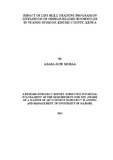Impact of life skill training program on livelihood of orphan-headed households in Nyando division, Kisumu county, Kenya
Abstract
Children in child-headed households are severely disadvantaged in that they
do not have the opportunity to learn much-needed life skills which most children learn
from their parents or adults who they live within the same family set up. However,
schools, churches and some of the organization working with the vulnerable children
provide these skills through life skills training program. The purpose of this study
therefore, was to examine the extent to which life skills training program has
impacted on the livelihoods of orphan-headed households in Nyando Division,
Nyando District of Kisumu County. The research objectives are: To determine the
extent to which decision making skills as a component of life skill training program
impacts on the livelihoods of orphan-headed households in Nyando Division; To
assess how communication skills as a component of life skills training program
impacts on the livelihood of orphan-headed households in Nyando Division; To
determine how coping mechanisms as a component life skills training program
impacts on the livelihoods of orphan-headed household in Nyando Division; To
investigate the extent to which self-management skills as a component of life skills
training program impacts on the livelihoods of orphan-headed households in Nyando
Division. The research design adopted for the study is a descriptive survey targeting
orphaned boys and girls 17 years and below who are child-heads. A censure technique
was used to select a sample size 50 child-heads, while purposive sampling technique
was used to select 10 supervisors of child-headed households, 5 teachers from local
schools and 5 local church elders/pastors. The study used questionnaires, interview
schedule and observation sheets to collect data. The tools were reviewed by both the
experts and the supervisor to test their validity while the reliability of the tools was
tested using the test re-test method. The study adopted the descriptive statistics to
analyze quantitative data with the help of the SPSS® computer software while content
analysis method was used to analyze qualitative data. Upon collection data was keyed
and cleaned and analyzed and presented using distribution tables, percentages and
mean. The data provided information on the impact of various components of life
skills training program on livelihood of orphan-headed households. Findings indicated
that the life skills training program had assisted 42 (84%), child-heads who took part
in the study to make decisions related to income with ease, 46 (92%) child-heads to
exist better in their community 36 (72%) to cope well by use of complimentary
coping mechanism and 25 (50%) to improve their self-esteem and self-confidence
thus impacting indirectly on their livelihoods. The study concluded that life skills
training program has an impact in livelihood of orphan-headed households. The study
recommended strongly that teachers be taken on refresher courses of life skills. It
recommended that Government to partner with other stake holders to empower the
community in life skills training to create sustainability. More time to be allocated on
the school time table to life skills lessons and teaching of life skills to be done in
clusters of age groups instead of the current academic mastery method. The study
proposes that further studies to examine the role of supervisors in orphan-headed
households and the healthy coping mechanisms of child-heads and how they can best
be married with the trained mechanisms.
Citation
Master Of Arts Degree In Project Planning And Management Of University Of Nairobi, 2013Publisher
University of Nairobi,
Collections
- Faculty of Education (FEd) [6022]

